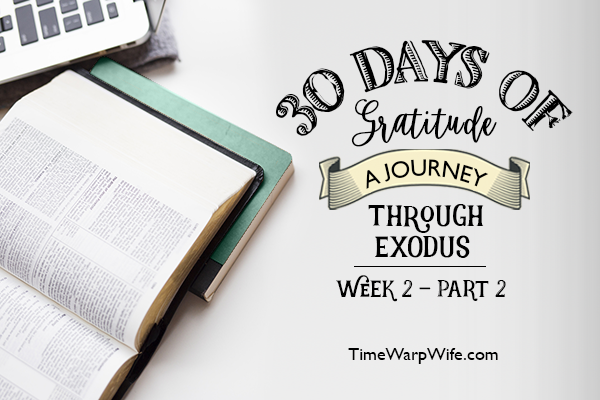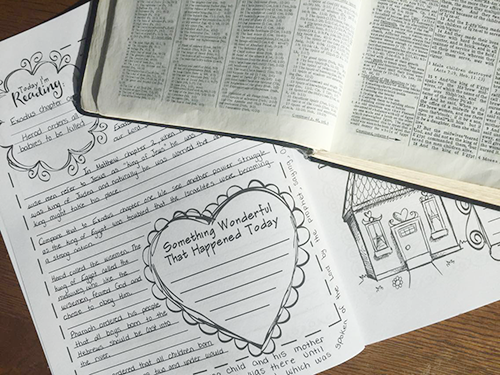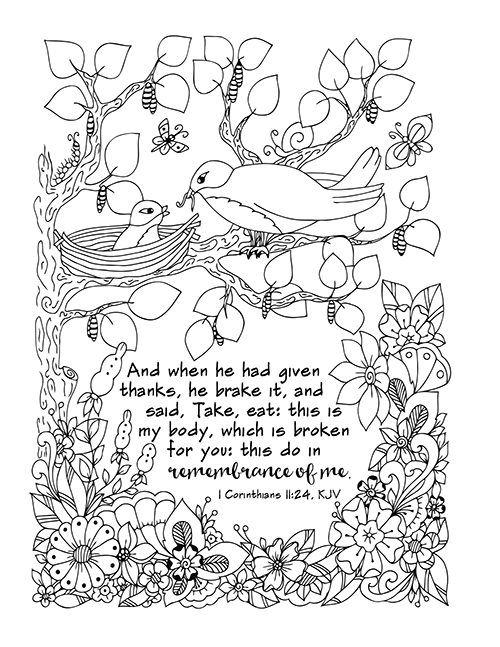
Note: I heard that many of you didn’t receive Monday’s mailout. I’m terribly sorry about that. Apparently there was a glitch in the html, and so it didn’t get delivered to the feedburner which feeds the mail service. Anytime you miss a post, you can always find them on my homepage here.
Week 2 – Exodus chapters 5-8 (8 will be added later this weekend)
Below are my notes for the week. Don’t forget to pick up your coloring page at the bottom of the post. Have a great weekend!
P.S. Don’t forget to join in our 30 days of gratitude each day. You can find those posts on my facebook page too!

Exodus 5 – Pharaoh Increases the Labor

Shown above Quieting Your Heart: Gratitude Journal, available at Amazon (affil link)
Exodus chapter 5 shows us how manipulative and evil Pharaoh was. Not only did he reject God’s command to let His people go, he also went to great extents to undermine God’s plan.
By taking away the straw, he increased their labor, making it impossible for the slaves to keep up with their quota. This frustrated the Hebrews, who took out their anger on Moses and Aaron.
It would have been easier for them if Moses and Aaron hadn’t gone to Pharaoh with their request. It would have been easier for them if things stayed as they had been–at least for a season.
So it is in our own lives when it comes to doing the right thing. Following God isn’t the easy road, in fact it’s difficult when Satan seeks to undermine God’s plan for your life. The Bible tells us that he walks about seeking whom he may devour. He’ll make your life as difficult as possible in hopes that you’ll turn your back against God and return to a life of sin.
Those who trust God and believe in His Son look ahead to the promise of life in His kingdom. We trust God because we know that the suffering we experience here is temporary, and that nothing we experience is comparable to unspeakable blessings ahead.
“Be sober, be vigilant; because your adversary the devil, as a roaring lion, walketh about, seeking whom he may devour: whom resist stedfast in the faith, knowing that the same afflictions are accomplished in your brethren that are in the world. But the God of all grace, who hath called us unto his eternal glory by Christ Jesus, after that ye have suffered a while, make you perfect, stablish, strengthen, settle you.” – 1 Peter 5:8-10

Exodus 6 – Looking to the Promise Ahead
In chapter six, we see God reveal Himself to His people as Jehovah. It would seem as though this name was new to them, but in fact it was frequently used in the book of Genesis where it’s often translated as “Lord.”
Jehovah, “Yĕhovah” means “the existing one.”
Here’s where it gets interesting. The root word, “hayah” means “to happen, fall out, occur, take place, come about, come to pass.”
So there was much more to God’s name than His existence, there was a promise of something yet to come.
By revealing Himself as Jehovah, He was signifying to His people that the hope of the promise was near. Again, this was important to them since the promise of becoming a mighty nation was passed down for hundreds of years.
He goes on to reaffirm the promises of making them a strong nation, redeeming them from the bondage of slavery, and giving them the land of Canaan.
Isn’t it amazing to see how these promises parallel the covenant between Jesus Christ and His church? They were God’s people, as we too are God’s people, when we believe in Jesus Christ. He has redeemed His people with a mighty hand through His death on the cross, and finally He is preparing a home for us according to the promises He made.
“Let not your heart be troubled: ye believe in God, believe also in me. In my Father’s house are many mansions: if it were not so, I would have told you. I go to prepare a place for you. And if I go and prepare a place for you, I will come again, and receive you unto myself; that where I am, there ye may be also.” – John 14:1-3
Be careful that you don’t fall into the same mindset that the Isrealites did, when “they hearkened not unto Moses for anguish of spirit, and for cruel bondage.” (Exodus 6:9)
When following Christ gets difficult, or when you start losing faith look ahead to the promise with hope.

Exodus 7 – The Ten Plagues Begin
When I read Exodus through the first time, I was kind of stumped on chapter seven verse one, “And the Lord said unto Moses, See, I have made thee a god to Pharaoh: and Aaron thy brother shall be thy prophet.”
When I read it through again, I found the answer in chapter four, verse 16, “And he [Aaron] shall be thy spokesman unto the people: and he shall be, even he shall be to thee instead of a mouth, and thou shalt be to him instead of God.” And so we see that God was affirming that Moses would be the mediator. He would be God’s instrument of power over Pharaoh and to the Hebrews, while Aaron would be his voice.
This chapter is a pivotal point in the Exodus story. From here we start to see the 10 plagues of Egypt unfold, proving the sovereignty and the authority of God. Over the years, the Egyptians worshipped hundreds of false gods. These gods would soon be minimized by the demonstration of God’s supreme power over the earth.
Wikipedia states, “The beings in ancient Egyptian tradition who might be labeled as deities are difficult to count. Egyptian texts list the names of many deities whose nature is unknown and make vague, indirect references to other gods who are not even named. The Egyptologist James P. Allen estimates that more than 1,400 deities are named in Egyptian texts, whereas his colleague Christian Leitz says there are “thousands upon thousands” of gods.” (Wikipedia: Ancient Egyptian Dieties).
As we are going through them, however, we can definitely spot some of them such Hapi, the god of the Nile. I was studying the Nile River earlier on this study and I remember reading how the Egyptians would walk along the banks of the river and spread seeds on the river banks. Every year, the banks of the river would flood, it would moisten the soil, and the seeds would bring forth a harvest. Of course they attributed this annual flood to the god of the Nile, Hapi, which is a slap in the face to the goodness of God.
I won’t tell you the others since I want you to consider them as you’re working your way through this study, but I will tell you that there’s a list of Egyptian deities you can refer to on Wikipedia. It’s a really interesting read. Here’s a link:
https://en.wikipedia.org/wiki/List_of_Egyptian_deities

Exodus 8 – The Plagues Continue

Today’s Coloring Page
Click here to view and print your copy

